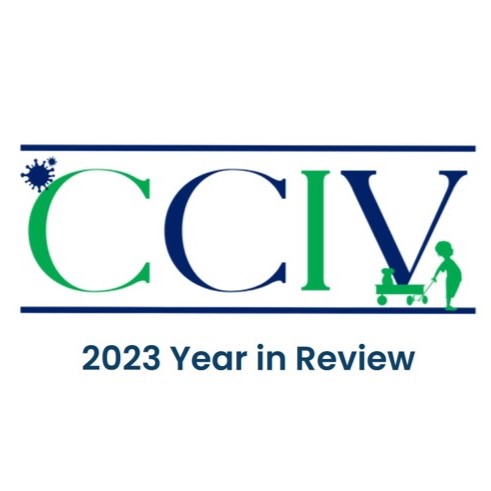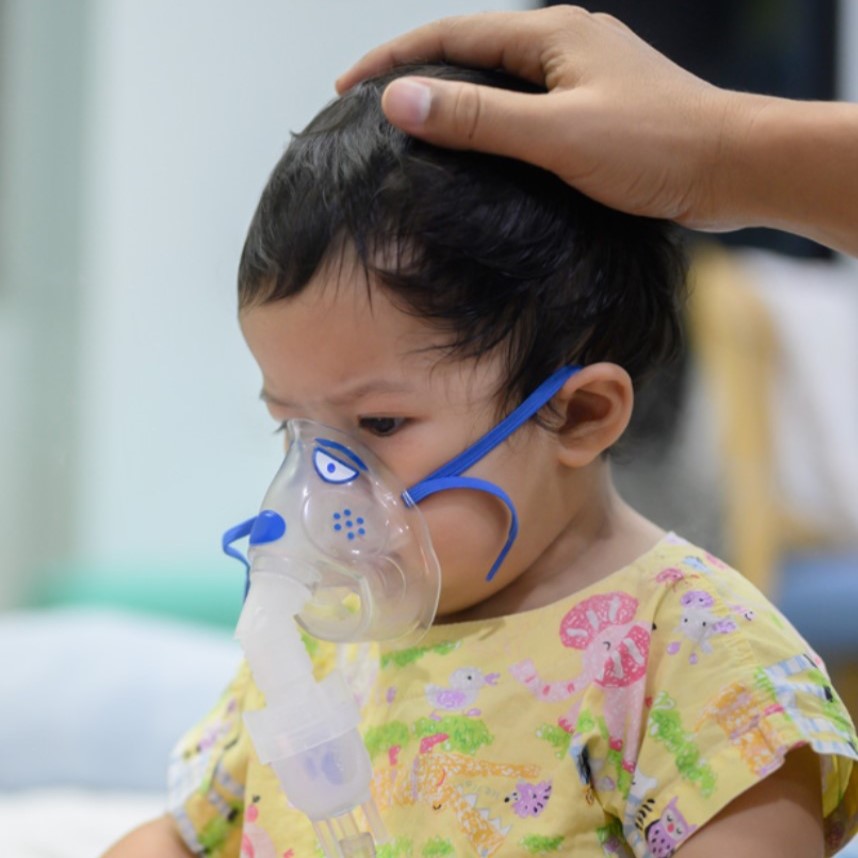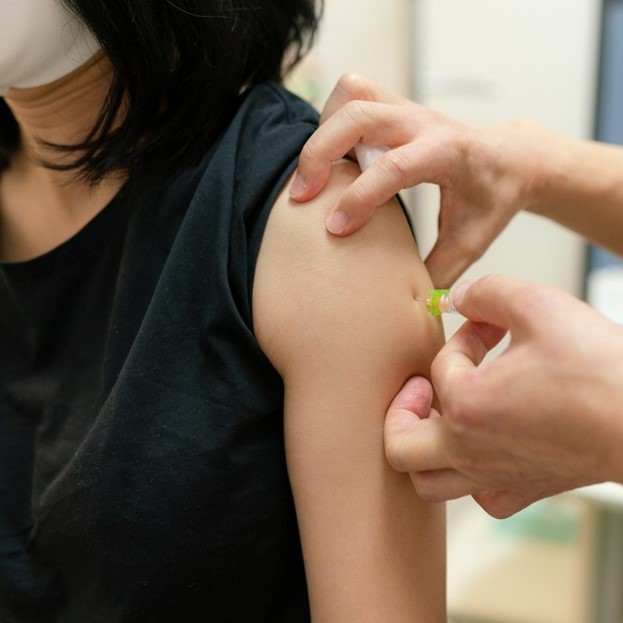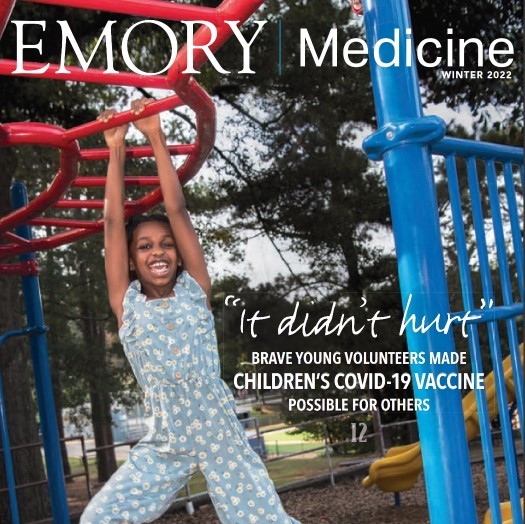News and Publications
Latest News
In the CCIV 2023 Year in Review Newsletter, Dr. Satoshi Kamidani is featured on page 6 for leading the newly awarded CDC contract for the CISA Project.
Link to CCIV 2023 Year in Review
Emory Children's Center- Vaccine Research Clinic is featured on page 33 for participation in the clinical trial leading to U.S. FDA approval of an immunization for respiratory syncytial virus (RSV) infections.
Link to CHOA and Emory 2023 Research Report
The Emory Children's Center - Vaccine Research Clinic was a site for the Mix-and-Match study for COVID-19 vaccines, which was featured in the Emory University News in early 2022.
Link to Emory News Center article
Emory Children's Center - Vaccine Research Clinic was featured in the Spring 2022 issue of Emory Medicine Magazine highlighting our young volunteers participating in children's COVID-19 vaccine research studies.
Link to Emory Medicine Magazine article
Publications
Below are publications that we want to highlight.
A Phase 1, Double-Blinded, Placebo-Controlled Clinical Trial to Evaluate the Safety and Immunogenicity of HEV-239 (Hecolin) Vaccine in Healthy US Adults
HEV-239 is safe and elicits a durable immune response through at least 6 months after the third dose in healthy US adults.
Read the ArticleA Phase 1 randomized trial of homologous and heterologous filovirus vaccines with a late booster dose
Overall, our data demonstrated that a heterologous Ad26.ZEBOV/MVA-BN®-Filo prime-boost was safe and immunogenic and established immunologic memory primed to respond after re-exposure.
Read the ArticleA Phase 2 Clinical Trial to Evaluate the Safety, Reactogenicity, and Immunogenicity of Different Prime-Boost Vaccination Schedules of 2013 and 2017A(H7N9) Inactivated Influenza Virus Vaccines Administered With and Without AS03 Adjuvant in Healthy US Adults
Administering AS03 adjuvant with the second H7N9 IIV dose and extending the boost interval to 4 months resulted in higher peak antibody responses. These observations can broadly inform strategic approaches for pandemic preparedness.
Read the ArticleAdverse Event Following Immunization Monitoring System in Japan
This article summarizes the monitoring system of adverse events following immunization (AEFI) and the unique compensation system (so-called relief system) in Japan.
Read the ArticleAltered Spike Immunoglobulin G Fc N-Linked Glycans Are Associated With Hyperinflammatory State in Adult Coronavirus Disease 2019 and Multisystem Inflammatory Syndrome in Children
This study aimed to define spike IgG Fc glycosylation following SARS-CoV-2 infection in adults and children and following SARS-CoV-2 vaccination in adults and the relationships between glycan modifications and cytokines/chemokines.
Read the ArticleBivalent Omicron BA.4/BA.5 BNT162b2 Vaccine in 6-Month- to <12-Year-Olds
These safety and immunogenicity data support a favorable benefit-risk profile for a variant-adapted BNT162b2 in children <12 years old.
Read the ArticleCharacteristics and Clinical Outcomes of Vaccine-Eligible US Children Under-5 Years Hospitalized for Acute COVID-19 in a National Network
We examined clinical characteristics and factors associated with vaccination status among vaccine-eligible young children hospitalized for acute COVID-19.
Read the ArticleClinical Features and Outcomes of Pediatric and Adult Patients Hospitalized for Coronavirus Disease 2019: A Comparison Across Age Strata
This study compared the risk factors, symptoms, and outcomes of children and adults hospitalized for COVID-19 from March 2020 to May 2023 across age strata at 5 US sites.
Read the ArticleDevelopment and comparison of immunologic assays to detect primary RSV infections in infants
The RSV immune state of the young child, i.e., previously RSV infected or not, is important to the conduct and interpretation of epidemiology studies and vaccine clinical trials.
Read the ArticleDurability of Original Monovalent mRNA Vaccine Effectiveness Against COVID-19 Omicron–Associated Hospitalization in Children and Adolescents — United States, 2021–2023
Pediatric COVID-19 vaccination is effective in preventing COVID-19–related hospitalization, but duration of protection of the original monovalent vaccine during SARS-CoV-2 Omicron predominance merits evaluation, particularly given low coverage with updated COVID-19 vaccines.
Read the ArticleEffectiveness of BNT162b2 Vaccine for Preventing COVID-19-Related Hospitalizations: A Test-Negative Case–Control Study
It is important to understand real-world BNT162b2 COVID-19 vaccine effectiveness (VE), especially among racial and ethnic minority groups.
Read the ArticleEvaluation of Immunoglobulin A Enzyme Immunoassays to Detect Primary Respiratory Syncytial Virus Infection in Infants and Young Children
We developed and evaluated 4 immunoglobulin A (IgA) antibody enzyme immunoassays (EIAs) with the RSV F, subgroup G (Ga or Gb proteins) or RSV lysate antigens to distinguish infection induced from persisting maternal RSV antibodies.
Read the ArticleImmune thrombocytopenic purpura and Guillain-Barré syndrome after 23-valent pneumococcal polysaccharide vaccination in Japan: The vaccine effectiveness, networking, and universal safety (VENUS) study
This study evaluated the value of the VENUS study by assessing the incidence of immune thrombocytopenic purpura (ITP) and Guillain-Barr´e syndrome (GBS) following vaccination with the 23-valent pneumococcal polysaccharide vaccine (PPSV23) using a self-controlled case series (SCCS) design.
Read the ArticleImmunogenicity and safety of varying dosages of a fifth-wave influenza A/H7N9 inactivated vaccine given with and without AS03 adjuvant in healthy adults
AS03 adjuvant improved the immune responses to an inactivated fifth–wave H7N9 influenza vaccine, particularly in younger adults, but invoked lower responses to drifted H7N9 strains.
Read the ArticleNeutralizing Antibody Immune Correlates for a Recombinant Protein Vaccine in the COVAIL Trial
For COVAIL recipients of a coronavirus disease 2019 (COVID-19) Sanofi booster vaccine, neutralizing antibody titers were assessed as a correlate of risk (CoR) of COVID-19.
Read the ArticlePlasma cell-free RNA signatures of inflammatory syndromes in children
This study identified cfRNA as a versatile analyte for the differential diagnosis and characterization of a wide range of pediatric inflammatory syndromes.
Read the ArticlePrenatal Maternal Immunization for Infant Protection: A Review of the Vaccines Recommended, Infant Immunity and Future Research Directions
This review aims to provide an understanding of the recent history and progress made in the field and highlight the importance of continued research and development into new vaccines for pregnant populations.
Read the ArticlePrevalence, Clinical Severity, and Serotype Distribution of Pneumococcal Pneumonia Among Adults Hospitalized With Community-Acquired Pneumonia in Tennessee and Georgia, 2018–2022
Understanding the pneumococcal serotypes causing community-acquired pneumonia (CAP) is essential for evaluating the impact of pneumococcal vaccines.
Read the ArticleRelative Contribution of Diagnostic Testing to the Diagnosis of Respiratory Syncytial Virus in Hospitalized Adults in the United States
Respiratory syncytial virus (RSV) is a leading cause of acute respiratory illness (ARI) in older adults. Optimizing diagnosis could improve understanding of RSV burden.
Read the ArticleSafety and Immunogenicity of an mRNA-1273 Booster in Children
Safety and immunogenicity data support administration of an mRNA-1273 booster dose in children aged 6 months to 11 years.
Read the ArticleSARS-CoV-2 Viral Load in the Nasopharynx at Time of First Infection Among Unvaccinated Individuals A Secondary Cross-Protocol Analysis of 4 Randomized Trials
SARS-CoV-2 viral load (VL) in the nasopharynx is difficult to quantify and standardize across settings, but it may inform transmission potential and disease severity.
Read the Article